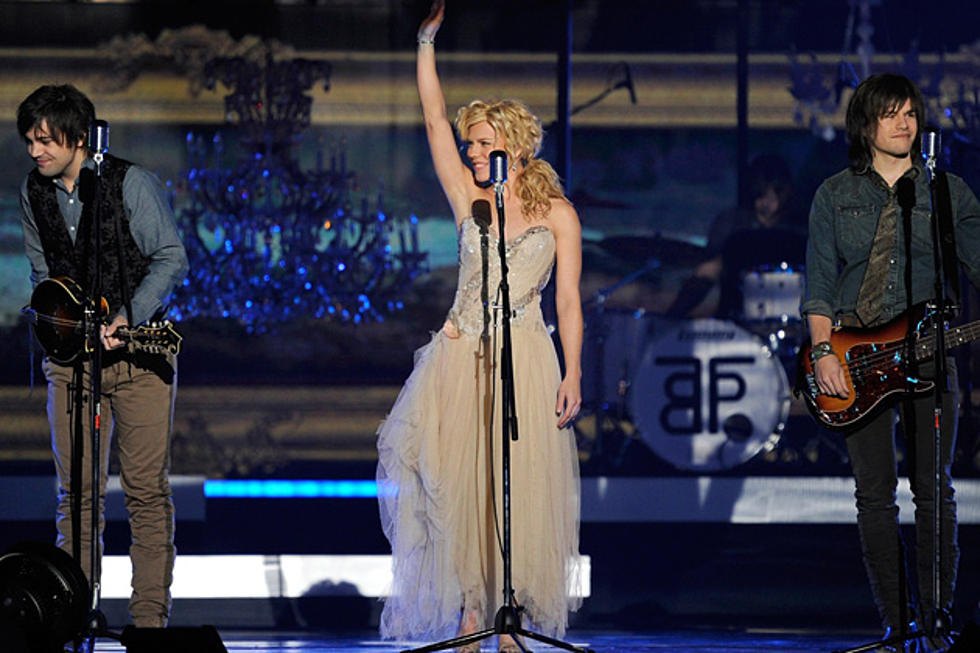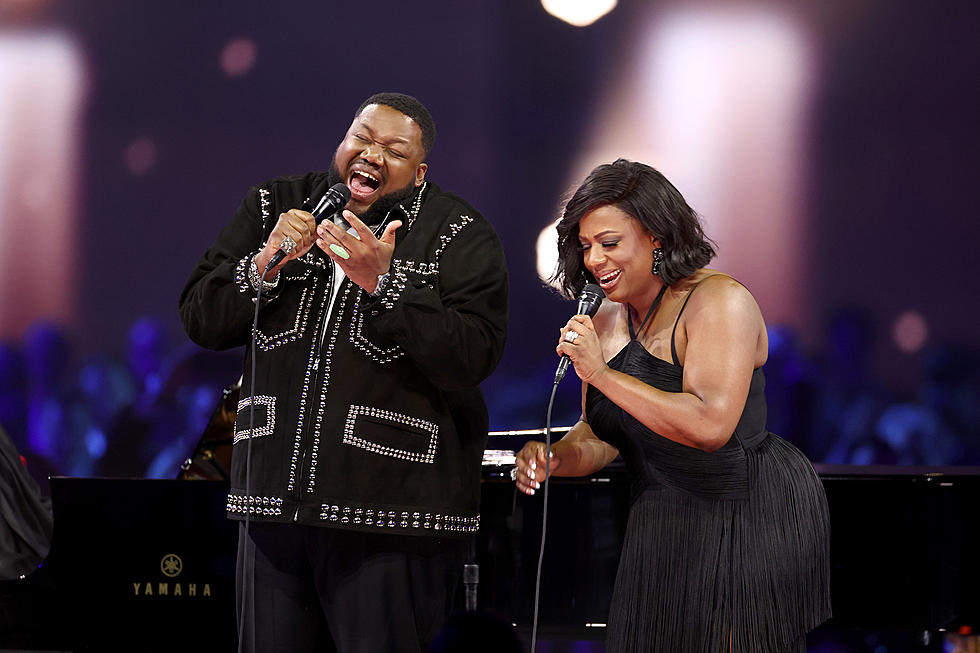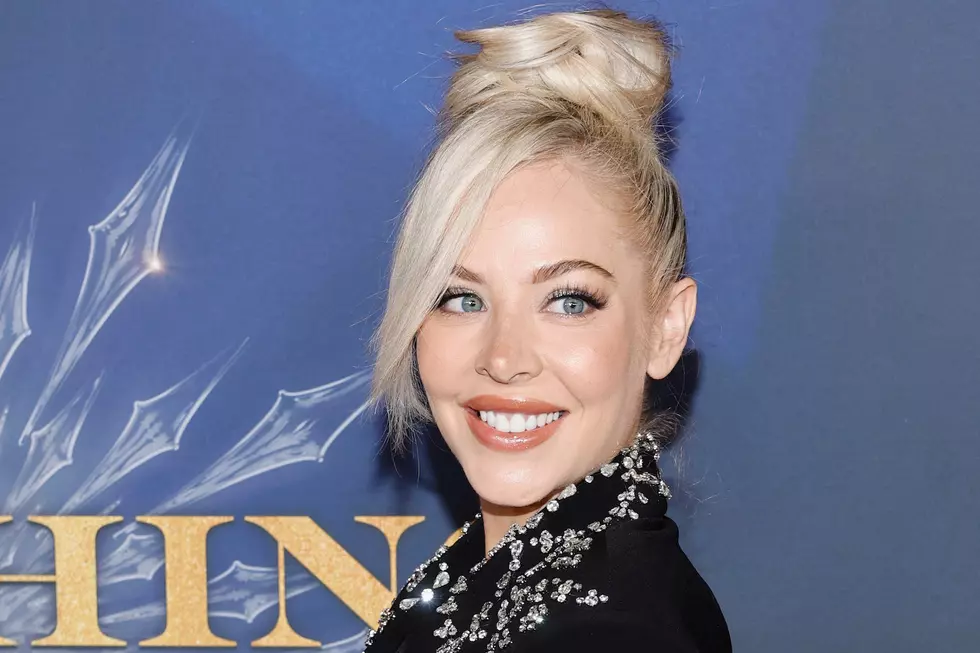
What Does It Mean to Have the No. 1 Song in Country Music?
Earlier we reported that the Band Perry has the No. 1 song in country music, but what does that mean? There is an entire industry built around getting an artist's single to No. 1, but surprisingly few country music fans are aware of how or if that benefits an artist, or how they can help get their favorite song to the top of the charts. The long, strange journey to No. 1 is complicated and full of obstacles, but the methodology is fairly simple and unromantic.
To begin, answer this without the help of Google. Which of these songs was a No. 1 hit on country radio? Consider it for a few moments as the answer will come later.
A) 'Stay' by Sugarland
B) 'Believe' by Brooks and Dunn
C) 'I Love You This Big' by Scotty McCreery
There are two country music charts, and it's not uncommon to have a song reach No. 1 on the Billboard chart the same week a different song reaches No. 1 on the Mediabase chart. Both charts count the amount of times a select group of radio stations play each song during a given week. But the artist with the most plays isn't automatically No. 1. This is because each radio station is weighted. Assuming equal ratings, airplay in Chicago will reach more ears than airplay in Buffalo, N.Y., so it's worth more.
So with chart placement being decided by which song reaches the most listeners (on about 100 select radio stations) and the two charts recording spins from a different list of radio stations, one will find a few inconsistencies. On occasion, the No. 1 song on one chart will receive less airplay than the No. 2 song on the same chart, but because it received more airplay from stations in bigger cities it's ranked higher. Something similar happened in the chart week ending on Dec. 5, 2011. Brad Paisley's 'Camouflage' received 2,585 spins amongst reporting Mediabase stations, good for No. 17. Dierks Bentley's 'Home' had 2,619, good for No. 18.
That's enough of a math lesson for now. You might be asking, "Why in the heck does any of this matter? Does an artist really benefit from reaching No. 1 instead of No. 2?" Sort of. Lee Brice was kind enough to explain.
"Honestly, I don't think there is a real difference," he tells Taste of Country. "Just to have a hit song in general -- that's why a lot of times people say, 'Man I love your No. 1 song' and in their minds it's just a song that was a hit to them." It's a regional hit. There's no better example than Scotty McCreery, who dominates airplay in his hometown of Raleigh, N.C. but isn't necessarily received as warmly in every city.
Brice has never had an official No. 1 hit as a performer ('Love Like Crazy' reached No. 2), although he has reached the top of the charts twice as a songwriter, most recently with the Eli Young Band's 'Crazy Girl.' He says an artist who doesn't write his or her own music doesn't benefit directly from radio play, but there are plenty of indirect benefits.
"You don't see a direct check from that song, but what you see is your show pays go up ... and you're able to make more money on the turnaround because you have a hit," he explains. The only way an artist who doesn't write music makes money he says, is from concert ticket and merchandise sales, or endorsements.
For a songwriter, each spin on radio banks him or her a royalty check. While the per spin royalty begins with a decimal point instead of a dollar sign, those add up. Depending on the life of the No. 1 hit, it could earn enough to pay for a house. Not a mansion at first, but a pretty nice house. Songwriter Dave Barnes (who wrote 'God Gave Me You,' recorded by Blake Shelton) says that songwriters get an additional 12 cents each time their song is sold, as an album cut or as a single. To date, Shelton's 'Red River Blue' album has sold about 532K copies, and the single has been scooped up about 1.3 times. (1.8 million x $.12 = $216,000 for the songwriter. That's before the radio play royalties.)
Some songs reach No. 1 but fail to sell many albums or singles. George Strait has had eight No. 1 hits since 2001, but only one of those has gone Gold for over 500K copies sold, digital or otherwise. His albums haven't had trouble selling, but that really doesn't matter to him as until recently he didn't write many of his hits. Strait is an example of an artist who has taken the indirect benefits of having a No. 1 hit to the maximum.
Brice says if he had to choose between a No. 1 hit that no one requested or hunted down on iTunes and a Top 10 hit that fans were crazy about, he'd take the Top 10. That brings up another secret of No. 1 hits. Sometimes they're not the songs America loves -- they're just the songs the fewest amount of people hate.
"Sometimes in my mind ... I'm kind of a songwriter guy so I wanna hear a smart lyric and this and that," Brice says. "But then you can put on 'The Joker' (by the Steve Miller Band) or something and some people would rather just hear something easy to listen to, and sometimes that's just those songs that might not sound like rocket surgery but they still have a hit factor about them. But they still bring in the cash."
Taylor Swift is consistently reaching No. 1 and writes all of her own music, so you can imagine what her bank account looks like. If Brice hadn't written 'Crazy Girl' and Garth Brooks' 'More Than a Memory' (in addition to a few album cuts), he would still very much be a working artist, making essentially a middle class income.
So which of those songs listed at the start of this article reached No. 1? The answer is D) None of the above. Yes, two of the biggest songs of the last 10 years -- and the debut single from the recent 'American Idol' winner -- never topped the charts. 'Stay' peaked at No. 2 in 2008, 'Believe' only reached No. 8 in 2006 and 'I Love You This Big' only reached No. 15. The lesson is that often the most requested songs don't reach No. 1 because if there is one person who loves it, there is another who groans every time it's played. Speaking of requests …
Artist fan clubs frequently band together to blitz radio stations with requests in an effort to get a song to the top of the charts. These attempts are often misguided. Imagine this conversation between a radio DJ in Cleveland and a caller.
Caller: Can you play 'All Your Life' by the Band Perry?
DJ: Sure, where are you from?
Caller: This is Suzy from Green Bay, Wisconsin.
DJ: I'll try to get it on.
If that DJ plays 'All Your Life' -- this week's No. 1 country song -- it's going to be because he was planning on playing it anyway, or it was already programmed. Most stations use a computer program to dictate when they'll play songs, but it's not as evil and corporate as it sounds. A good radio station is concerned about what the local listening audience wants, not listeners in another time zone. To be frank, Suzy isn't going to buy from that station's advertisers, so she's wasting her time. She'd be better off calling her local station, but if that station reports to one of the two charts, the programmer isn't putting much stock in individual requests. For this reason, fan club blitzes are an archaic form of helping an artist, and in some cases can be harmful. Radio DJs will become irritated by callers who berate them for not playing their song immediately.
If you want to help an artist, be nice, buy the single and then convince your friends and family to buy it and maybe some concert tickets. After that, cross your fingers and pray because there are a million ways things could go wrong on that climb to the top, but that is for another article.
More From Taste of Country
![Tim McGraw Brings Famous Friend Onstage During Nashville Show [Pictures, Setlist + Video]](http://townsquare.media/site/204/files/2024/04/attachment-Tim-McGraw.jpg?w=980&q=75)




![Fans Are Loving Keith Urban +Lainey Wilson’s Collab ‘Go Home W U’ [Listen]](http://townsquare.media/site/204/files/2024/04/attachment-Keith-Urban-Lainey-Wilson.jpg?w=980&q=75)



